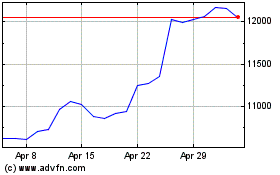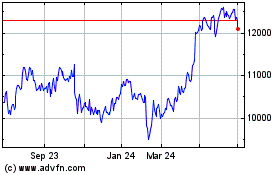By Denise Roland
Seeking an edge in the increasingly competitive market for
cancer drugs, one of the industry's largest companies is taking a
bold but risky approach: targeting the early stages of the
disease.
AstraZeneca PLC's new cancer research chief, José Baselga, wants
the company to prioritize early-stage cancers over advanced disease
when developing new cancer drugs. If successful, his unorthodox
strategy could reap rewards for both patients -- the potential to
cure cancer is much greater when it is treated early -- and company
coffers.
The approach turns the tried-and-tested model of cancer drug
development on its head. Typically, drug companies aim their new
cancer drugs at patients with advanced forms of the disease who
have exhausted other treatment options. Of the more than 30 new
drugs for solid tumors approved for sale in the U.S. since the
start of 2014, just two targeted early cancer.
That is largely because there is a clear-cut case for testing
new drugs on patients with advanced cancer, as they don't have
other options. What's more, measuring a new medicine's effect in
advanced cancer is straightforward: a meaningful extension in
survival can usually be measured in months. Such patients are also
often more willing to try experimental drugs, and regulators have
smoothed the path for treatments that show they can prolong lives
by delaying tumor growth in advanced cancer.
AstraZeneca will still carry out initial testing in
advanced-stage patients to establish the safety of brand new cancer
drugs. But Dr. Baselga, who joined AstraZeneca earlier this year,
wants drugs that clear that hurdle to be developed for early-stage
patients first.
Dr. Baselga said in an interview that he was challenging
AstraZeneca's researchers to come up with a plan to develop "every
single new compound" first and foremost for early-stage cancer.
AstraZeneca will later this year start trials for early-stage
breast cancer with DS-8201, a drug it is codeveloping with Japan's
Daiichi Sankyo Co., he said.
Analysts say the approach has potential but would face big
hurdles. "It's not impossible," said Citi analyst Andrew Baum. "But
it would involve a major change in paradigm outside of breast
cancer," which is one area where companies have made some progress
in developing drugs for early-stage disease.
Dr. Baselga's strategy builds on a sharpened focus on cancer at
AstraZeneca in recent years aimed at reviving the company after a
series of patent expirations on best-selling drugs like cholesterol
pill Crestor knocked billions of dollars off the company's annual
sales over the past decade.
AstraZeneca isn't alone in investing heavily in cancer medicine.
Rivals including Pfizer Inc. and Merck & Co. are also pushing
into the disease, spurred by scientific breakthroughs, a permissive
regulatory environment and the promise of high returns. Between
2007 and 2017, the number of cancer drugs in late-stage clinical
trials surged more than 60% to 710, according to IQVIA, a
health-care data provider.
Targeting early-stage cancer could give AstraZeneca an edge. The
potential market is large, especially in tumor types where the
majority of patients are diagnosed at an early stage, such as
breast and prostate. Around two-thirds of breast-cancer patients
are diagnosed when their disease is at an early stage, according to
the National Cancer Institute.
Dr. Baselga -- a prominent breast cancer doctor -- said it is
getting easier to prioritize early cancer due to better ways of
identifying which patients are at higher risk of their tumors
returning and the rise of drugs that can more accurately target
tumor cells, reducing potential side effects. Dr. Baselga was
previously chief medical officer at Memorial Sloan Kettering Cancer
Center before stepping down last year after his failure to disclose
payments from the drug industry in some academic journal articles.
He says those omissions were inadvertent.
"We need to spend our resources on those places where we can
cure more people and that's in early disease," he said. "It's a
deep philosophical belief that we have."
Still, the path to prioritizing early cancer could be
thorny.
When cancer is caught early, the tumor is usually removed or
killed using a mix of surgery, chemotherapy and radiation therapy.
In some patients, this already constitutes a cure. That creates a
high bar for any new drug, which would have to prove it
significantly reduced the chances of the tumor returning.
"One thing with early stage disease, you have to be able to cure
patients," said Daniel Chen, who spent more than a decade running
cancer drug development projects at Roche Holding AG. "The majority
of cancer drugs delay cancer growth, they don't cure patients." Dr.
Chen is now chief medical officer at biotech start up IGM
Biosciences Inc.
Running clinical trials could also be difficult, as it would
involve persuading patients to try experimental drugs when they
might already be cured.
Another challenge is measuring the drug's effectiveness. In
patients whose cancer is diagnosed and treated early, it would take
years to determine whether a new drug meaningfully extended
survival, making for very long clinical trials.
Dr. Baselga said it was now possible in some cases to identify
patients whose cancer was more likely to return after surgery by
monitoring the levels of tumor DNA in their blood. Such patients
may be more willing to try a new drug that might improve their
chances of beating the disease for good.
He also pointed to the Food and Drug Administration's
preliminary approval in 2013 of a Roche breast cancer drug for
early-stage disease, based on a relatively short trial that showed
it reduced the number of cancerous cells in the tissue surrounding
the tumor before surgery. A yearslong follow-up trial confirmed
that the drug, Perjeta, improved survival in the long term.
"What applies in breast ought to apply in the majority of tumor
types," said Dr. Baselga. "Tumors don't care about location, humans
do."
Write to Denise Roland at Denise.Roland@wsj.com
(END) Dow Jones Newswires
May 27, 2019 08:14 ET (12:14 GMT)
Copyright (c) 2019 Dow Jones & Company, Inc.
Astrazeneca (LSE:AZN)
Historical Stock Chart
From Mar 2024 to Apr 2024

Astrazeneca (LSE:AZN)
Historical Stock Chart
From Apr 2023 to Apr 2024
